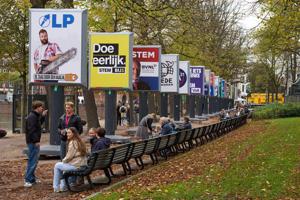UPDATE: The Netherlands is in the midst of a highly contentious snap election as voters head to the polls today, July 15, 2025, to decide the future of their government. The election was triggered by Geert Wilders, the controversial anti-Islam lawmaker, after he dismantled the previous four-party coalition over immigration disputes.
Polling stations opened early, with voters casting their ballots at various venues including city halls, historic windmills, and even the iconic Anne Frank House museum in Amsterdam. Polls close at 9 p.m. local time, when an initial exit poll will provide insights into the election’s outcome.
The election centers on critical issues affecting millions, particularly the ongoing housing crisis and the contentious debate over immigration. With a nation polarized by these topics, the results could redefine the political landscape of the Netherlands. Wilders’ Party for Freedom (PVV) is projected to secure the largest number of seats in the 150-seat House of Representatives, but mainstream parties are hesitant to collaborate with him again after his role in collapsing the previous coalition.
“It’s up to the voters today,” Wilders stated after casting his vote, surrounded by security. His confidence reflects the PVV’s polling strength, calling for a complete halt on asylum-seeker entries into the country.
Opposing him, Frans Timmermans, leader of the center-left coalition comprised of the Labor Party and Green Left, expressed concerns about the rise of right-wing populism. “It’s going to be so close… we hope to come out as first, as that is the only guarantee to avoid a right-wing government,” he told reporters as he arrived to vote with his dog in Maastricht.
Voter turnout is crucial, with many citizens expressing dissatisfaction with established parties. “This time there will be a more progressive party who can take the lead,” said Olga van der Brandt, 32, reflecting a desire for change among younger voters. Meanwhile, Henri Bontenbal, leader of the Christian Democrats, warned of a fundamental shift in Dutch politics, stating, “The question is, is it possible to beat populism by decent politics?”
As tensions rise, violence erupted at a recent anti-immigration rally, showcasing the deep divisions within the nation of 18 million. Voter sentiment is shifting, with many undecided until the last minute, which could alter the dynamics of the election significantly.
The outcome of today’s election will set the stage for coalition negotiations expected to begin tomorrow. The Dutch system of proportional representation typically prevents any single party from gaining a majority, complicating the formation of a stable government.
As the clock ticks down to the close of polls, voters are left to ponder the implications of their choices. Will they embrace the divisive politics of Wilders or opt for a more inclusive approach to governance? All eyes are on the Netherlands as results begin to emerge, making this a critical moment in European politics.







